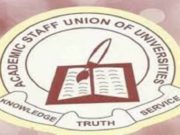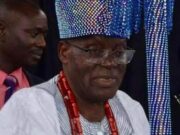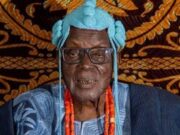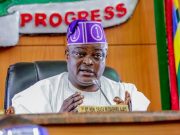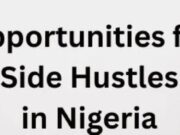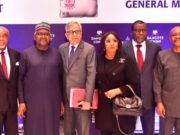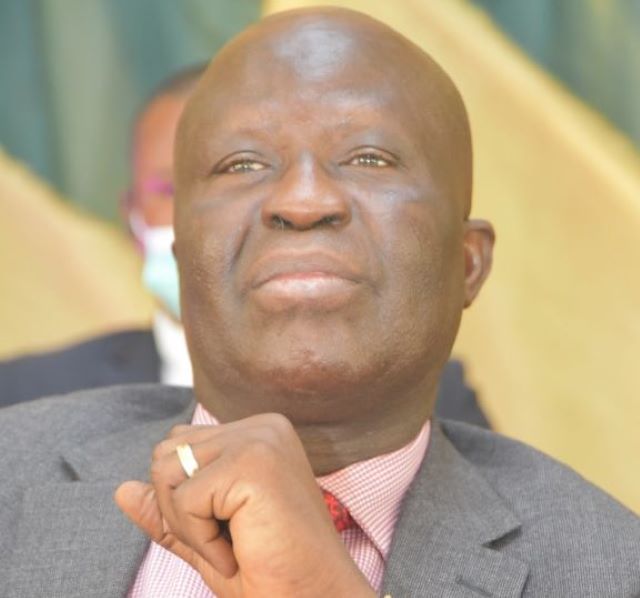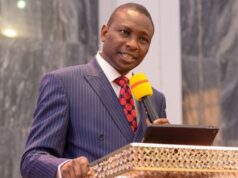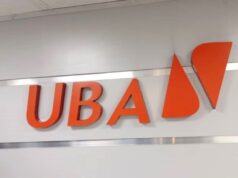- Says: Agric, Key To Solving Problem Of Unemployment In Nigeria
In this exclusive interview, the Vice Chancellor, Federal University, Oye Ekiti, FUOYE, Professor Abayomi Sunday Fasina talks about his background, academic career, the university community among other issues. The interview was conducted by our Correspondent in Ekiti, EMMANUEL ADENIRAN.
Can our readers meet you Sir?
Well, I am Professor Abayomi Sunday Fasina, the Vice Chancellor, Federal University, Oye Ekiti, FUOYE. I am a distinguished Professor of Pedology and a first class in that field of discipline.
Can you please tell us how you got to secure the appointment sir?
Well, as usual, when they want to appoint a Vice Chancellor, they will advertise, and then people will respond to the advert. They also do what we call research. They will research and set up a research team. There was a Research Team and due process was followed for the appointment of the Vice Chancellor. Initially, 76 of us responded; it was later reduced to 62; from 62, it got to 40, from 40 to 14. The 14 of us eventually did the interview and I came first at the interview. Talking about how I became qualified for the post; well, I was the Deputy Vice Chancellor of this University for four years. So, I was actually following up issues and matters, and the vision of the former Vice Chancellor. Also, I have actually worked with about 10 Vice Chancellors in my career. I was once the Dean of a Faculty for seven years. I was a Director of Advancement Center and International Linkages for another four years. I was Head of Department for 13 years. So, all these were considered. Also, I have been a manager of different Universities for going to almost 25 to 30 years. I acquired that experience that has actually made me to lead a team and to lead a University. All these experiences put together made me to be qualified for this post and God has been on my side. Above all, it was God’s doing and that’s why my God wins because I believe so much in God for everything that I do. I attribute every glory and everything to God.
It’s been two years now since you’ve been occupying this office, how have you been coping with the challenges you face?
First, you put everything in God’s hands. Everything I do, I ask God to always direct and guide me. I pray to God to give me wisdom and counsel to direct the affairs of the University. That’s why at FUOYE, God Wins. Also, we try as much as possible to do our management meeting every Monday. In that management meeting, we take decisions collectively. Democratization is a keyword here; in the sense that, we allow other people to have suggestions and input to whatever we are doing. First, it’s a kind of collective, inclusive governance. Second, we always dialogue with the Unions. We dialogue so much with the Unions and we are always very proactive. We don’t allow things to get out of hand before we take decisions. We also give students the opportunity to talk. We run open and transparent administration, and then, we make sure that we exhaust deliberations. We don’t just take decisions unilaterally; we carry everybody along. Inclusive governance has really helped us. Our welfare has been super for staff and students in terms of being good, in terms of providing the next infrastructure facilities and making everybody happy.
There were many conflicting stories in the media about the institution, how have you been able to manage the situation in the institution?
Well, that was before I came onboard. Before I came onboard, it has been very tough, and, you know, people jostle for position. Before I came on board, there was this tension because of the appointment that everybody was pursuing. Many people were interested in appointing their own candidate as the Vice Chancellor. When I came onboard, the first thing I did was to try to reconcile all aggrieved parties. I did lots of reconciliation, consultations and consolidations. What I did was to make sure that, as many people that were aggrieved were approached – and this included the former ASUU Chairman that was suspended, he was reinstated, and now, he is back on the campus. I tried as much as possible to reach out to all the 110 aggrieved staff members and I was able to resolve all their differences. I did that by setting up a committee to do that. The Committee did a beautiful and excellent job. All the noise people were making were political noise; influenced by self-interest. They are stakeholders, so everyone wants to take care of his own domain. The point is that, we were able to win some of these domains and get the stakeholders on our side. We were able to reconcile and talk to them so that the University can move forward in the best interest of students and staff. Don’t forget that despite all these, we were the fifth and sixth most subscribed University in 2021 and 2022, out of about 260 Universities in the whole of Nigeria. This is an achievement of FUOYE. People ask that, why did many candidates subscribe to FUOYE, but the answer is that our calendar is stable, and the environment is peaceful. We also reduced our school fees, which is now one of the cheapest. Things are now working. The environment is also now conducive too so everybody wants to be here, to be identified as student of this school. Also, we have good scholars who are lecturers here.
During the press conference heralding the activities for the seventh Convocation Ceremony of the School, you listed several of the achievements you recorded since you assumed the position of the Vice Chancellor. Will you like to elaborate more sir?
Well, we have achieved a lot within the last two years. Don’t forget that before I came onboard, I had a vision. I had a Vision Statement that I put forward while delivering my inaugural speech. What we have been doing actually has been to look at that Vision Statement and see how we can follow it to the latter. This has actually guided us; because we use it as a compass. Whatever you see us doing is in that compass. We have done virtually everything in that guidebook. We promised welfare and we have put on ground, a good welfare package. We promised increase in students’ population and we have done that. Our population as at when I came onboard was about 20,000 plus. Now, we are about 43,000 if not more than that. Also, we said that we were going to generate wealth through creating new programmes, and we have done that by creating part-time programmes that has almost 6000 students within the space of two years. We also created top-up programme. All these bring money in terms of creating wealth. There is what I call RISK to wealth. I believe that as an intellectual, when you look at it, R stands for Resources; the resources are there, I stand for Ideas, S stands for Skill and K stands for Knowledge. If you put all these together, you will be able to harness huge resources to create wealth. For example, I believe that people in Agriculture have lands, they have ideas and they have resources in terms of human resources; and they have knowledge and skill. They should be able to produce food. When we created the part-time, we wanted to put it in Ado Ekiti, at Christ School, but we brought it to Ayegbaju Ekiti and the people in Ayegbaju accepted us. Today, it is a different ball game because we created Commerce in Ayegbaju Ekiti and the people there welcomed us. Today, everybody is enjoying in Ayegbaju Ekiti. We have since expanded the Part-Time programme to other six towns in Ekiti: Ifaki, Itaji, Ilupeju, Ayedun, Ilupeju and Ikole. The idea is that as we are expanding, people in some of these towns are feeling the impacts because we created Commerce in those towns. The Keke NAPEP man would have to make money and the woman who sells food, bread would have to make money also. In aspect of accommodation; landlords will have to make money and okada man will make money. It’s a kind of symbiotic mutual thing. This actually led to other towns coming to us. As I am talking to you, four towns have written that they want us to come to their towns and establish a Campus of the Part-Time. Igbemo Ekiti has written, Iye Ekiti has written, Isinbode Ekiti has written, and for each of them, they want us to come. For instance, Isinbode Ekiti wants us to come and put our Medicinal Garden there for the Faculty of Pharmacy. Iye Ekiti wants Distant Learning. You can see all of them have one thing or the other and they want us to come because they believe that we have tried it in some other towns and we succeeded. For me, some of these achievements are many. In addition, when we came onboard, many of the towns had no classrooms and in the space of two years, we built 30 classrooms. We promoted 50 Professors within a space of two years and we have promoted 736 staff within a space of two years. We are doing these things for staff and the students. We introduced the College of Medicine, Data Science Analysis as a course, Agriculture Business, Agriculture Farm Management, many programmes were introduced and all these have given FUOYE a good name. Because of that, FUOYE became popular. For me, we would not have been able to achieve all these if not for the peace and stability we have on campus. There has been no strike, no violence and no crisis. For instance, government said we should go home for three weeks for this election; we have planned an online teaching for our students already. As I am talking to you, trainings are going on for lecturers and students, so we are not going to lose anything. As a matter of fact, when we return from the three weeks holiday given by the Federal Government, we will only do one week revision and then exams will follow immediately. A good and great leader should be proactive to plan and work under pressure. We have developed our ICT Structure and Centers. We have expanded our student population; our quota for various courses has also increased.
Recently, you commissioned some projects at the various Satellite Campuses of the institution; we would like you to give details of them?
We commissioned 13 projects. We commissioned two Lecture Halls at the Faculty of Social Sciences; it’s a 3 in 1 laboratory. We commissioned two lecture theatres at the Faculty of Pharmacy, two lecture theaters at the Faculty of Education and two different lecture theaters at the Faculty of Science. We commissioned a Central Library at Ikole Ekiti. We commissioned a Freedom Park where we have a Fountain Heart also. We commissioned a Bus donated to the University by somebody in the Community. We commissioned Aiyedun Ekiti Part-Time programme building. We commissioned a Computer Science Laboratory with about 50 sets of Laptops donated by an indigene of the community and we also laid the foundation for 275 sitting CBT Center at Ire Ekiti. We commissioned so many other things. Those are the ones I can remember for now.
As the Vice Chancellor, how will you want to rate the academic performance of your students?
The students are doing excellently well. In fact, some of them have won laurels outside. We have gotten feedbacks of some of our students who have gone to do Masters and PHD overseas and they emerged as some of the best students. Some of our lecturers are International Scholars including myself. One of our staff here was appointed as a Vice Chancellor of BOWEN University. Another lecturer, Dr. Brown was appointed as Commissioner for Science and Technology in Edo State. Prof. Ojo Rasaq Bakare was also appointed as Commissioner for Culture, Arts and Tourism in Ekiti State. Presently, as I am talking to you, he has led a team to India to represent Africa and Nigeria in a World Cultural Heritage programme where Nigeria was declared winner. We have many lecturers that are very sound as international Scholars who have been able to impart some of our students and that is why our products have been very super.
How disciplined are your students, especially, when it comes to the issue of exam malpractice?
I must confess to you, there is no University that does not have crisis or problems. Our students are very good. They have their own problems too and it’s very minimal. Many are now good ambassadors of the University. They behave very well. For example, we have zero tolerance for sexual harassment, exam malpractices and cheating. We have told them. We read the university’s Handbooks to them. So, they know from day one, day of orientation. They are always very careful. That is, if any one of the students fights, he or she will be expelled. They know all the rules because we have given them serious orientation and this has actually helped us a lot.
Can you tell us about the impact of TETFUND in your institution?
Well, I must confess, TETFUND has done so well because we have actually accessed it up to the year 2022. We have accepted virtually all our interventions such as the ones for library, infrastructure and ICT zonal annual and we have set up till date. TETFUND has done so much for us. We have used our IGR to build all the new classrooms and they are 30 in number. We have received our annual and zonal intervention.
Well, will you wish to discuss some of the challenges your University is presently facing sir?
Funding is one; it’s basic. Funding is our major challenge and it specifically has to do with overhead expenditure. Government gives us subventions every three months. I don’t know what that one can do with a population of almost 43,000 students and over 2,000 Staff. You can see that funding has been our major problem. Well, we still need more infrastructures on campus. We are trying everything we can do to improve our income and improve the infrastructures on the campus. We still need more laboratories, more classrooms because the population of students keeps on increasing. On the issue of land encroachment by the all these ‘Omo Oniles’, we have been making efforts to resolve the issues now because we are trying to manage them. Although some of them have charged us to court, but their lawyer has been very corporative with us but some of the land owners are not. What we did was that we got some money from TETFUND, and you can see we have started doing our perimeter fencing. Once we succeed in fencing the University, we will take possession of the land. When the ‘Omo Oniles’ took us to court, we told them that it is government’s land belonging to both the State and Federal Governments. We told them that the lands have been taken over by the government and that, if they go there, they are on their own.
Sir, will you say that FUOYE is well staffed?
Well, in terms of non-Teaching, we are well staffed. But for the academics, we are not well staffed. In terms of salary, the issue of ‘JAPA’ has suddenly taken over. Many Professors have resigned and travelled overseas. The government salary is not encouraging at all. In the last few weeks, only God knows the number of our lecturers that have resigned; Professors, Senior lecturers, lecturers, most of them have all gone. This is because of this syndrome of ‘JAPA’. They just resign and travel abroad. Some of them who have gone for their PhDs do not want to come back again. This is because it has been a general problem with our country Nigeria. I wouldn’t say we are properly staffed. We still need support and we have written to the Head of Service of the Federation to give us approval to employ more lecturers and to replace those who have resigned, retired or died.
Do you wish to talk about some of the major challenges the country is facing in the education sector?
Well, for me, government should abide by the 26% UNESCO funding of Education. No country dares toil with its education, it will not go scot-free. The country will pay for it later in life. When our people are not properly trained, they become toxic later in life, which is very dangerous for us. Let me give you a regular example, Dubai decided to give priority to their education, they said in the next 50years, their mission, there programme for the country is knowledge economy. They sent many of their youths to different countries of the World like China, Japan, U.K., U.S.A. for training, and they returned after completing their training. You can see what is happening there today, Dubai is well developed, because they focus more on knowledge economy, which is Education. I think we should also do the same thing in our country. We have what it takes here. Government should just allocate more money into education and make use of the people in education sector. I have said it in one interview that the people, that is: the technocrats, Professors and lecturers in the University are sound in their various fields. Abroad, the Engineers are the ones designing many vehicles. Why can’t you make use of the Engineers here in the academic environment? Why can’t the Federal Government make use of people in agriculture to develop the country’s Agricultural sector? I have said it several times that the Technocrats are the people with the knowledge on how to handle a lot of things. If you put somebody who is not knowledgeable on something and you ask him to handle that thing, he will mess up the thing. Who does that? For me, I think government should not play politics with education, agriculture and health sectors of our economy. If you look at our last Convocation Ceremony, I brought Chief Wole Olanipekun, SAN; he is a guru in law. We have appointed him as a Professor of Practice in Law. So, he is going to teach our student’s Law practice. There is difference between theory and practice. This man will teach them practicals. I am trying to bring a synergy between the Academia and the Industry, and I tell you, it’s going to pay us. Government has not really looked at what happened for eight months when universities were closed. I think we need to spend more on education and take care of the Lecturers. I tell you, an average lecturer earns about N400, 000 per month. It’s not up to $1000 that an average lecturer in U.S., in U.K., earns depending on the categories/levels. Some earns as much as $10,000 a month. If you convert that, that is almost N7million in a month. So, tell me, if I get a job there and I am earning close to N7 million per month, won’t I go there. Government should spend more money on education, especially, by taking care of the welfare of the lecturers and putting adequate infrastructures in the Universities.
What do you think is the way out on the issue of unemployment in Nigeria?
I think the problem is that, somebody who is an Agriculturist has no business looking for job. He should even create jobs. For example, if I retire; I don’t want to work for anybody. I will just create a farm somewhere and be creating jobs by employing people to work on that farm. For me, entrepreneurship is the key. We should develop our Agricpreneurship and entrepreneurship instead. Once you have developed your entrepreneurship skills, students who graduate will not be looking for any job. They will create jobs and will employ other people. Another way is that we should find a way of giving loans to our students especially in the area of Agriculture, to set up their own. Agriculture production, processing, storage, marketing and transportation. Any student can fit in to any of these chains and then create their own jobs. Somebody may decide to be in production, somebody may decide to be in processing, somebody may decide to be in the marketing, somebody may decide to be marketing fish or process fish. Agriculture is a key to solving the problems of unemployment in Nigeria. The problem is that, everybody is looking for white-collar job that is not even there. Then, government has not helped the Industry. They should give incentives such as tax incentives to industries.
What’s your advice to Nigerians?
I pray that the Lord will help this Country. There is no point of anybody going abroad; we call it ‘Japa’ syndrome. We should all stay here to develop this country, to make it like Dubai, U.S.A., Silicon Valley of America, and I pray that the Lord will help us. Government should endeavor to spend more money on education and agriculture so that the country will be out to where it belongs as a nation, in the Committee of Nations in Africa. This will make Nigeria to be the best in terms of offering services to other parts of Africa and the World.








